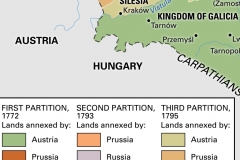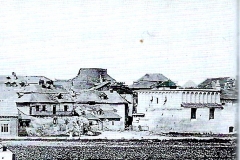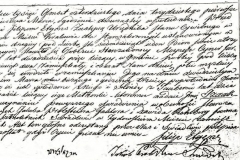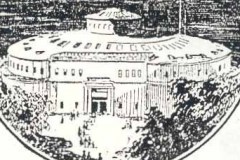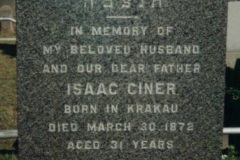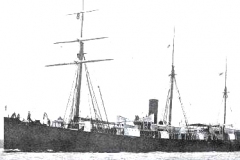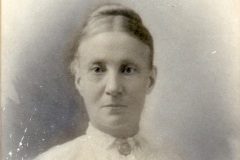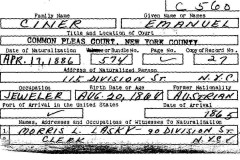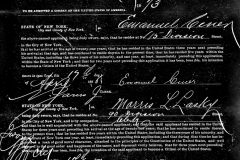An Immigrant’s Dream: Emanuel Ciner’s Story
1864-1900
Emanuel Ciner in Crakow (Krakow)
Emanuel Ciner was born “Mendel Cyner” in Crakow on July 2, 1864.[1] From DNA testing on the Ciner male line, we know that his ancestors were Ashkenazic Jews who settled in German speaking lands centuries before.[2] In the 1860s, Cracow was a city with a population of about 50,000 with between 13-17,000 Jewish residents predominately living in Kazimierz quarter with its many synagogues. Crakow was located in the Province of Galicia that was part of the Austro-Hungarian Empire from 1772 through World War I. On all documents and censuses, Emanuel stated that he was born in Austria, or the Austro-Hungarian Empire, or occasionally Germany. Krakow (Kraków) is now a major city in Poland with a restored Jewish quarter.
The Cyner surname was derived from “Zinn,” the German word for tin or pewter.[3] It would have been pronounced “zinner.” Emanuel’s grandfather Moses (Moyses) Cyner was a carter, a person who owned a horse and buggy. He could not read, write or sign his name.[4] Moses was born in 1815 and his wife Hindy Tauber was born the same year.[5] Hindy’s father was Izaak (Efroim) (1796-98 – 1837),[6] and her grandfather was Efraim (Leib) Tauber (1758-63 – 1829).[7]
Hindy and Moses’ son (Emanuel’s father) Izaak Cyner was born in his parents’ home on May 22, 1840.[8]
Translation of Izaak Cyner’s Birth Record from Polish: In the year of 1840, 31st of May, at 12 o’clock noon, before me -Filip Ergons ass. clerk in charge of Civil Status archives in Free City of Krakow, established in the second parish,, number 171 – appeared in person Moyses Cyner of Jewish faith, carter, age 25, living in the 6th parish number 52. He showed me a child of male gender which was born in his home on the 22nd of May of this year, at 3 o’clock p.m. He declared that the child was fathered by him and Hindy born Tauber, his wife, 25 years old. The child was given the name of Izaak. In the presence of Jakob Probstein and David Croneberg, I read aloud the above declaration that was then signed by me and the witnesses. M. Cyner did not sign because he cannot write. Signatures: Filip Ergons, Jakob Probstein, D. Croneberg, Hebrew signature.[9]
Hindy died in 1847, perhaps in childbirth because their second daughter Mindel died in early 1848.[10] Moses married Tillie Graber; their first son Leibel (Louis) was born in 1849.[11]
Emanuel Ciner’s Immigration and Early Years in New York City
Izaak Cyner married Leah Eisenberg who was born in 1841 in Cracow. They decided to emigrate with their infant son in 1865 with hopes to improve their lives in America. [12] We believe they were the first of their family to take that step. This was a time of limited emigration; “between 1820 and 1870 about 20,000 Galician Jews emigrated to the United States.”[13]
The family would have traveled by train or horse and cart from Cracow to Hamburg or Bremen, Germany. Emanuel was told that he was very ill during the 2 to 3-month ocean voyage on a sailing ship. They arrived at Castle Garden, New York. Family lore has it that Leah Cyner, upon her arrival and seeing all the buildings festooned with black and purple bunting, exclaimed, “Gott im Himmel, Franz Josef ist tot!” [God in Heaven, [Emperor] Franz Josef is dead!][14] This would date the family’s arrival to just after the assassination of President Abraham Lincoln on April 15, 1865.[15]
Like so many Jewish immigrants, Izaak and Leah put down their roots in the Lower East Side of New York City. Within two years, Izaak was employed as a shoemaker;[16] we do not know if he had learned shoemaking before his emigration. In 1867 the family lived on Canal Street and moved to Grand Street. They changed the spelling of their surname “Cyner” to “Ceiner,”[17] and then to “Ciner”[18] shortly after they arrived. It was always pronounced “signer” (like the signer of a document). Izaak spelled his name “Isaac,” and Leah often used the name Lena.
Isaac and Leah started a slipper and shoe retail store on Division Street near Maiden Street. They made slippers in the back of the store and also sold shoes that were made elsewhere. They lived above or behind the store. Leah and Isaac were Orthodox Jews. They belonged to a synagogue on 7th Avenue.[19] They had three daughters: Mary (b. 1867); Fannie (b. 1869); and Elizabeth (Lizzie) (b. 1871).
In March 1872 at age 31, Isaac had an appendicitis attack. He went to barbershop where leeches were applied.[20] He died on March 30, 1872.[21] Isaac was a member of a Jewish Burial Society of Crakow landsmen (Congregation Agudath Achim M’Krakauer, organized in 1867) and was buried in its plot in Washington Cemetery in Brooklyn.[22]
Emanuel remembered that within a few years, his grandfather, Moses Cyner, traveled from Cracow to New York City to see where his son was buried. In 1879, Moses and his second wife Tillie Graber Cyner took the steamship North Star from Hamburg to Moville, Scotland and another steamship Ethiopia to Castle Garden. He was listed as a tradesman from Krakau on one ship manifest and as from Austria on the other.[23] As the only male in the family, Emanuel had the responsibility to take him to the cemetery. He recalled that his grandfather was “a tremendous, big man.” Moses immediately returned to Cracow and never returned to America; Emanuel never saw him again.[24]
Emanuel Ciner Learns the Jewelry Trade
Isaac left his widow Leah with three daughters under five years old and an eight-year-old son. Emanuel (called “Manny,” “Mannie”) helped his mother run the shoe shop then on Division Street. He only finished elementary school. In 1871, through a family friend, Emanuel apprenticed as a watchmaker. He did not like it and quit. In 1878, through another family friend, he started as an apprentice jeweler and in 1880 he listed his occupation as diamond setter.[25] He liked it. He was paid $5 a week. At the bench next to him, a man, who was not an apprentice, made $10 a week. Emanuel asked for a raise and was fired. Leah knew it immediately so would not give him lunch. He got another job at $10 a week. He placed $10 on her plate, and all was forgiven. Emanuel was promoted to foreman of the jewelry factory making gold settings for diamond jewelry. The owner had a daughter whom he wanted Emanuel to marry. Emanuel did not like her so he quit.[26]
.
Emanuel became a naturalized citizen in 1886. He listed his occupation as jeweler and Austria as his former nationality. His date of birth was incorrectly stated as August 20, 1864.[27]
Emanuel Ciner Moves Ahead
Leah continued to run the shoe shop, moving it from 123 ½ Division St. to 115 Division St.[28] Between 1890 and 1895 she moved her shop and home to 1582 1st Avenue.[29] For a time she moved her shop to Canal Street, which was considered “uptown,” but her English was so poor, she had to move back to the Lower East Side.[30] By 1900 she closed her shop.[31] Leah was a petite woman but displayed a strength of character throughout her life. According the US Censuses, she spoke German and Yiddish. Her descendants remembered that German was her predominate language, and she never spoke English well.[32]
Emanuel in 1892 started his own business. He continued to live with his mother and sisters at 1582 1st Avenue.[33] In 1898, the family moved uptown to 552 E. 85th Street[34] and then to 59 East 115th Street.[35] Because he was the only male in the family, Emanuel would not get married until his sisters were married.[36] In 1889 Mary (1869-1937) married Samuel Raives (1865-1935), who was born in Russia. Fannie (1870-1941) married Pinkus (Phil) Kasner (1865-1929), who was born in Crakow, about 1895; they lived in Brooklyn. In 1900, Lizzie (1871-1928) married Sidney Wasserberg (1870-1914), who was born in Crakow; they also lived in Brooklyn.
Notes
[1] Krakow Birth Register 1864 #718, July 2, 1864. Emanuel’s birth date was listed incorrectly as August 20, 1864 on his naturalization plea and incorrectly July 25, 1865 on his headstone.
[2] Male Y-Chromosome DNA testing of Jonathan Lewis Ciner, 2017.
[3] Dr. Alexander Beider, Dictionary of Jewish Names from Galicia. Avotaynu, 2004.
[4] Krakow Births 1798-1855, Izaak Cyner, 1840, Akt. #162, May 22, 1840. Galicia- Gubernia, Province: Krakow. Records of Births and Privileges who are of the Jewish Faith in the Free City of Krakow for the Year of 1840, vol. 2.
[5] Krakow Birth Register, 1840, #162, May 22, 1840.
[6] Krakow Death Register, 1837, # 289.
[7] Krakow Death Register, 1829, #159.
[8] Krakow Births Register, 1840, #162, May 22, 1840.
[9] Krakow Birth Register, 1840, #162, May 22, 1840.
[10] Krakow Death Register, 1847, # 689.
[11] Leibel Cinner, Krakow Birth Register, 1849, # 242, April 7, 1849.
[12] Emanuel Ciner Plea and Naturalization Card, April 17, 1886.
[13] As compared to the massive emigration from 1901-1914 when 350,000 Jews emigrated from Galicia. Kupovetsky, Mark. “Population and Migration: Population and Migration before World War I.” YIVO Encyclopedia of Jews in Eastern Europe 12 October 2010. 15 December 2019. <https://yivoencyclopedia.org/article.aspx/Population_and_Migration/Population_and_Migration_before_World_War_I>. From 1901-1914, 350,000 Jews emigrated from Galicia.
[14] Interview with Suzanne Wasserberg Klapper and Lorraine Wasserberg Rumpler.Emily Ciner Rose, 2002.
[15] No record has been found in ship or immigrations records.
[16] Gouldings New York City Directory. New York: Lawrence G. Goulding, 1872, 85.
[17] Trow’s New York City Directory. New York: J. F. Trow, 1867-8, 184.
[18] Gouldings New York City Directory. New York: Lawrence G. Goulding, 1872, 85.
[19] Irwin Ciner, interview. Emily Ciner Rose, 1997.
[20] Irwin Ciner, interview. Emily Ciner Rose, 1997.
[21] Isaac Ciner’s headstone, Washington Cemetery, Cemetery #1, Plot 104, Brooklyn, New York.
[22] Isaac Ciner’s headstone, Washington Cemetery, Cemetery #1, Plot 104, Brooklyn, New York.
[23] Moses Cinner and Tujtte Cinner, North Star Departure, August 22, 1879. Hamburg Passenger Lists, 1850-1934, Vol. 373-7, VIII B 1 Band 037, p.513. Moses Cinner and Tylle Cinner, arrival September 9, 1879, New York, Passenger and Crew Lists, 1820-1957.
[24] Irwin Ciner, interview. Emily Ciner Rose, 1997.
[25] Emanuel Ciner’s obituary, 1958. 1880 US Census.
[26] Irwin Ciner, interview. Emily Ciner Rose, 1997.
[27] Emanuel Ciner, Naturalization Card, April 17, 1886.
[28] New York City Directories- 1879, 248. 1881, 259; 1883, 274; 1884, 282; 1885, 290; 1886, 315; 1888, 323; 1889, 329; 1890, 330. 1880 US Census. Emanuel Ciner, Naturalization Plea, April 17, 1886.).
[29]: New York City Directory, 1895, 240.
[30] Interview with Suzanne Wasserberg Klapper and Lorraine Wasserberg Rumpler. Emily Ciner Rose, 2002.
[31] US Census 1900.
[32] US Census 1900; 1910. Interview with Suzanne Wasserberg Klapper and Lorraine Wasserberg Rumpler. Emily Ciner Rose, 2002.
[33] New York City Directories- 1895, 240; 1897, 244.
[34] New York City Directory 1898, 221; 1899, 224.
[35] New York City Directory 1900, 217; US Census 1900.
[36] Irwin Ciner, interview. Emily Ciner Rose, 1997.
